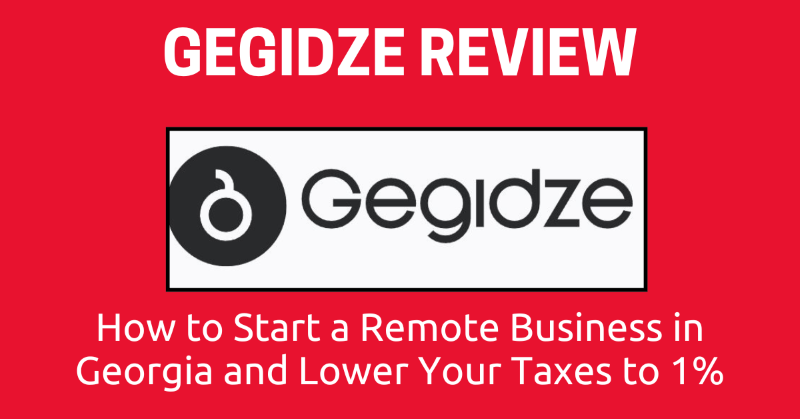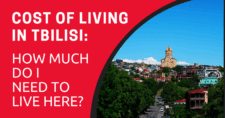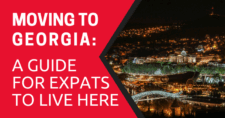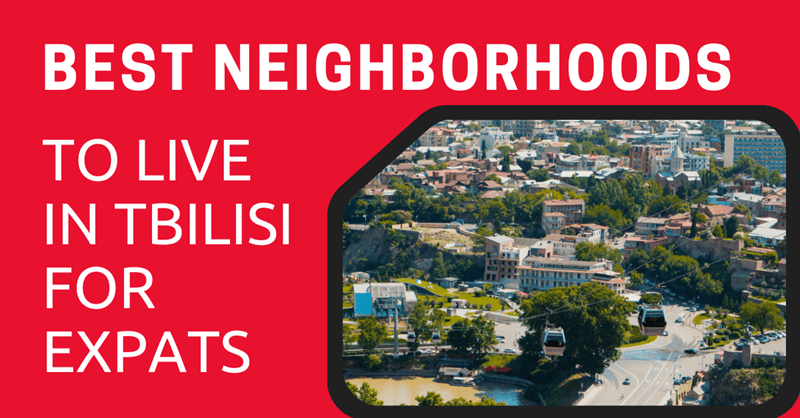
This article will take approximately 27 minutes to read. Don't have the time right now? No worries. Email the ad-free version of the article to yourself and read it later!
Discover the best neighborhoods to live in Tbilisi for expats. Compare cost of living, lifestyle, transport, and expat-friendly areas. Updated for 2025 with real insights.
Are you thinking about living in Georgia?
Until recently, the country stayed off most expat radars. But that changed when Georgia introduced a digital nomad tax scheme that lets you register as an Individual Entrepreneur and pay just 1% tax on your business income. Combine that with a visa-free stay of up to 365 days for citizens of over 90 countries, and it’s easy to see why Georgia has become a hotspot for digital nomads and start-ups.
If you plan to move here, Tbilisi, the capital city, will likely be at the top of your list. It’s affordable, safe, and full of coworking spaces, fast internet, and late-night cafes.
But each neighborhood in Tbilisi has its own vibe. For example, Vera has a laid-back scene with lots of creatives. Vake is green and quiet, perfect for families. Saburtalo is more modern and budget-friendly, with good access to the metro.
Instead of hopping between neighborhoods trying to figure it all out, this guide will help you choose the best one for your lifestyle. You’ll find out what it’s like to live in each area, what’s nearby, and where you’ll find the right kind of community.
Disclaimer: This article may include links to products or services offered by ExpatDen's partners, which give us commissions when you click on them. Although this may influence how they appear in the text, we only recommend solutions that we would use in your situation. Read more in our Advertising Disclosure.
Contents
- What Expats Should Consider When Choosing a Neighborhood in Tbilisi
- Best Neighborhoods in Tbilisi for Expats
- Other
- Tbilisi Neighborhood Comparison Table
- Frequently Asked Questions about Tbilisi Neighborhoods
- Which Neighborhood is Considered the Safest in Tbilisi?
- What’s the Best Neighborhood in Tbilisi for Retirees?
- Where do Most Digital Nomads Live in Tbilisi?
- What is the Most Walkable Area in Tbilisi?
- Vake vs. Vera. What’s better for expats?
- What are the Top Areas for Families in Tbilisi?
- Can I Live in Tbilisi Without Speaking Georgian?
- How does the Cost of Living Differ Between Central and Outer Neighborhoods?
- How Easy is It to Get Around Tbilisi by Public Transport?
- What’s the Right Neighborhood for Me?
What Expats Should Consider When Choosing a Neighborhood in Tbilisi
Before you move to Tbilisi, it’s a good idea to understand what everyday life will look like. Some neighborhoods are great for families, while others are better for digital nomads. Here are the main things to consider when picking the right area to live in.
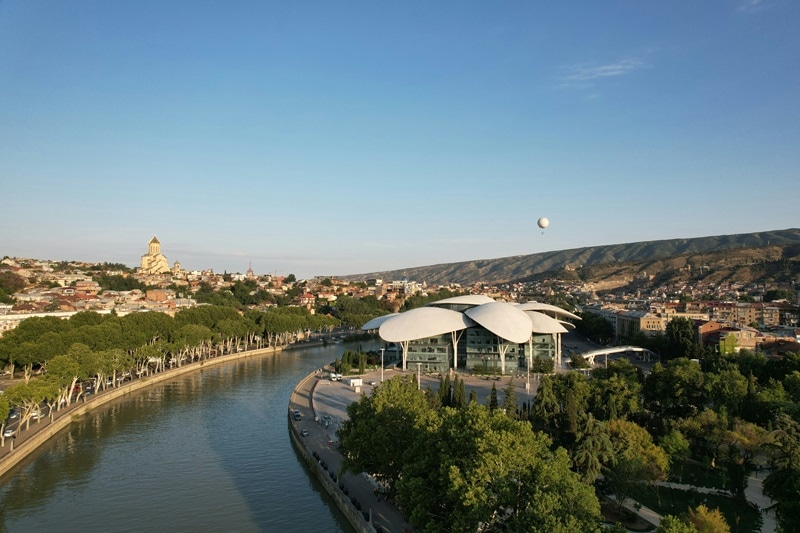
Living Cost
The cost of living in Tbilisi is generally affordable, but there’s still a noticeable rental cost difference between neighborhoods.
For example:
- A one-bedroom apartment in Vera or Vake can cost around $400–$600/month.
- In Saburtalo, you might find similar places for $300–$450/month.
- In Didube or Nadzaladevi, you can rent for under $250/month.
Most rentals come furnished. Prices can go up if you’re close to a metro station or in a newly built apartment. At the end of the day, your budget is going to decide which neighborhood you stay in.
Access to Public Transport
The metro is the easiest and cheapest way to get around Tbilisi. A single ride costs just 1 GEL (about $0.35), and the system is simple and covers key parts of the city.
Whenever I choose a place to stay in a new country, I always try to stay within a 10-minute walk of a metro station. It just makes life a lot easier, whether I’m commuting, running errands, or going out at night.
Convenience
Having a good supermarket or mall nearby can really improve your quality of life in Tbilisi. You’ll find large chains like Carrefour, Goodwill, Agrohub, and Fresco across the city.
If you live in areas like Saburtalo or Vake, you’re likely close to malls like City Mall or Tbilisi Mall, which have supermarkets, cafes, pharmacies, and banks all in one place.
Even in more local areas, small 24-hour shops and bakeries are common. But having a proper supermarket or mall nearby saves time, especially if you do not want to cook your own food.
Expat Communities
There are also certain areas that are more popular among expats. These neighborhoods are a good choice if you want to be active in the community, attend networking events, or make friends more easily.
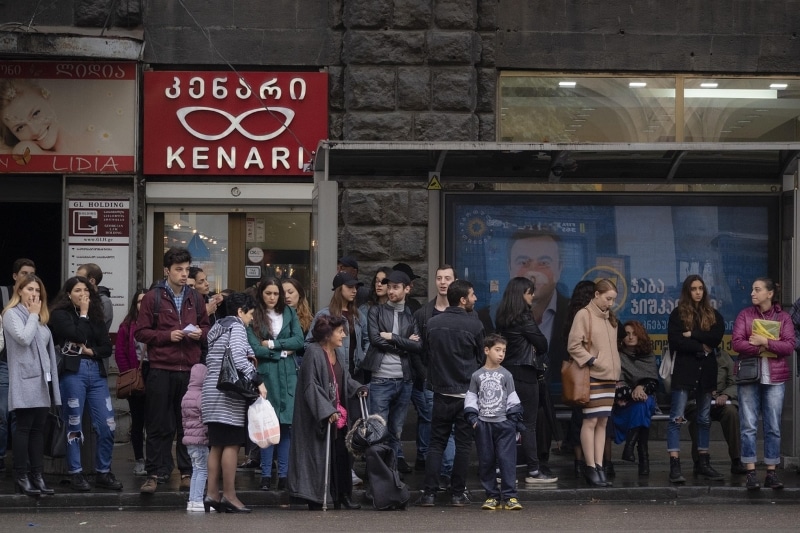
Most expats live in Vake, Vera, and Saburtalo, where they’re close to coworking spaces, gyms, cafes, and international schools. These areas also have the most English-friendly services and a lively social scene. But of course, the cost of living there is slightly higher than in other areas, and you might miss out on some of the more authentic local experiences.
On the other hand, neighborhoods like Avlabari, Old Tbilisi (Sololaki), Mtatsminda, and parts of Didube are also great places to live. They offer a more local feel and tend to be more budget-friendly, but the expat community in these areas may not be as active or visible.
Proximity to Coworking Spaces or Schools
Traffic in Tbilisi can be bad during rush hours. So it’s a good idea to stay close to the places you need to go regularly. During morning and evening rush hours, main roads like Chavchavadze Avenue in Vake or Rustaveli Avenue in the city center often get backed up. A normal 10-minute drive can easily turn into 30 minutes.
If you’re working remotely, it helps to live near a coworking space or at least a good café with reliable Wi-Fi. These coworking spaces are not just for getting work done, they’re also great places to meet new friends and connect with other expats.
Neighborhoods like Vera, Vake, and the Old Town have plenty of coworking spots. Popular ones include Impact Hub, Lokal, and Terminal.
If you have kids, most international schools like QSI, British International School, and European School are located in Vake and Saburtalo, making these areas a convenient choice for families.
Traffic Noise
This is not the very first thing I think about when looking at a neighborhood in Tbilisi. But after I do more research, it seems like noise can be a real issue in Tbilisi, especially if you live on a busy road. Sololaki and Mtatsminda have narrow streets that echo every car or motorbike passing through. Main avenues in Saburtalo and Vake can also get noisy during rush hour.
If you’re sensitive to sound, try to avoid apartments facing major roads or choose upper-floor units. Alternatively, look for listings that mention soundproof windows. It makes a huge difference.
Stray Dogs
Another thing you should keep in mind is the number of stray dogs around the city. Coming from Thailand, I thought stray dogs are the only problem here. However, it seems to be a big problem in Georgia too.
While most stray dogs are harmless, they can bark at night or follow you on a walk. In general, neighborhoods like Vake and Saburtalo have fewer strays, while outer or more local areas like Nadzaladevi and Didube may have more visible dog populations.
If you’re nervous around dogs, this is something to consider.
Best Neighborhoods in Tbilisi for Expats
Tbilisi is full of great neighborhoods, but picking the right one depends on your lifestyle, budget, and what you need day to day. Some areas are perfect for digital nomads who want to be near coworking spaces and cafés. Others are better for families who need to be close to international schools and parks.
In this section, I’ll walk you through the best neighborhoods in Tbilisi based on the five factors we talked about earlier: living cost, access to transport, convenience, community, and expat community.
Each area has its pros and cons. There’s no perfect neighborhood. It just depends on how you want to live. I’ve tried to be honest about both the good and the not-so-good parts, including my own experiences and observations.
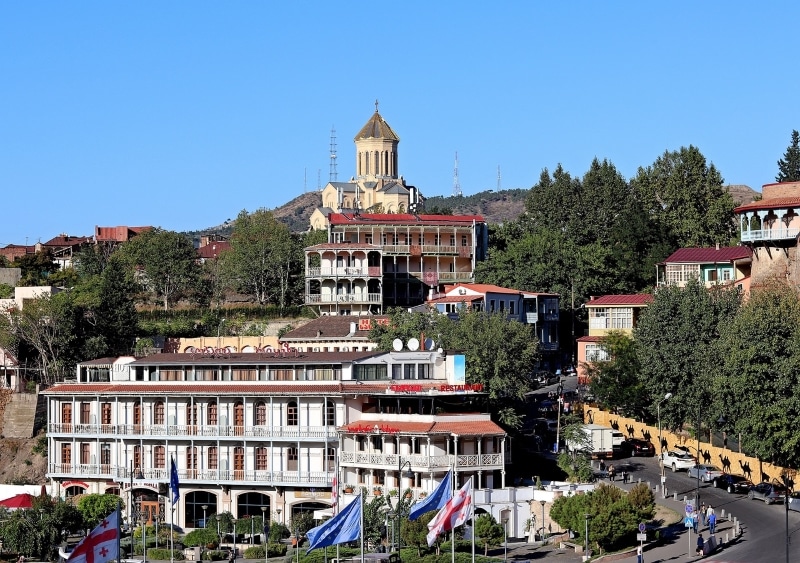
Vera
Good for: Digital nomads and young professionals
Average rent: Around $450–$600/month for a one-bedroom apartment, depending on condition and location
- Pros: Walkable, creative atmosphere, great cafes, strong expat presence
- Cons: Older buildings can be drafty, limited green space, parking is tough
Living in Vera gives you a bit of that post-Soviet vibe, you’ll see vintage concrete apartment blocks, narrow alleys, and dated facades. But that’s also part of its charm.
When I checked out Vera, I understood why Georgia is becoming more popular among digital nomads. I found many hostels with co-working spaces inside. This means you can live, work, and network with other digital nomads all in one place. It’s a very convenient setup, even Chiang Mai, one of the world’s most popular destinations for digital nomads, doesn’t really offer that.
Anyway, in my opinion, Vera is one of the most popular neighborhoods among expats in Tbilisi for three big reasons:
- CoLive and CoWork hostels: Vera is home to some of the best hybrid living-working spots in the city. Places like Fabrika, Lokal, and Kiwi Cafe bring together expats, digital nomads, and locals in a shared space that blends hostel, coworking, and social club. It’s a great way to meet people if you’re new to the city.
- Lifestyle: Life here is casual and vibrant. On weekends, you’ll see popup art markets, street musicians, and book fairs. It always feels like something’s going on, and it’s hard to get bored. There’s a laid-back, artsy vibe that makes Vera feel young and alive.
- Cost of living: Vera isn’t the cheapest neighborhood in Tbilisi, but it’s still more affordable than Vake or the tourist-heavy parts of Old Tbilisi. Rents in older buildings are reasonable, and most come furnished.
You’ll also find plenty of great food options, everything from classic Georgian restaurants to vegan cafés and natural wine bars. Small bakeries and fruit stands are tucked into quiet side streets, giving the area a village-like feel despite being right in the city center.
While the neighborhood is very walkable, Vera doesn’t have its own metro station, but Rustaveli Station is just a 5–10 minute walk away. If you’re heading farther out, the metro is usually the fastest way to get around Tbilisi. For shorter trips within the area, you can also take a bus, grab a taxi, or use a ride-hailing app like Bolt.
Vake
Good for: Families, expats with kids
Average rent: Around $500–$700/month for a one-bedroom; higher for larger or newer family-sized apartments
- Pros: Safe, green, family-friendly, quiet at night
- Cons: Traffic gets bad during rush hour, no metro access, pricier than average, a bit quiet for singles or digital nomads
Vake is an upscale neighborhood that feels more European than post-Soviet. You’ll see embassies, private clinics, and large apartment buildings with tidy entrances and underground parking.
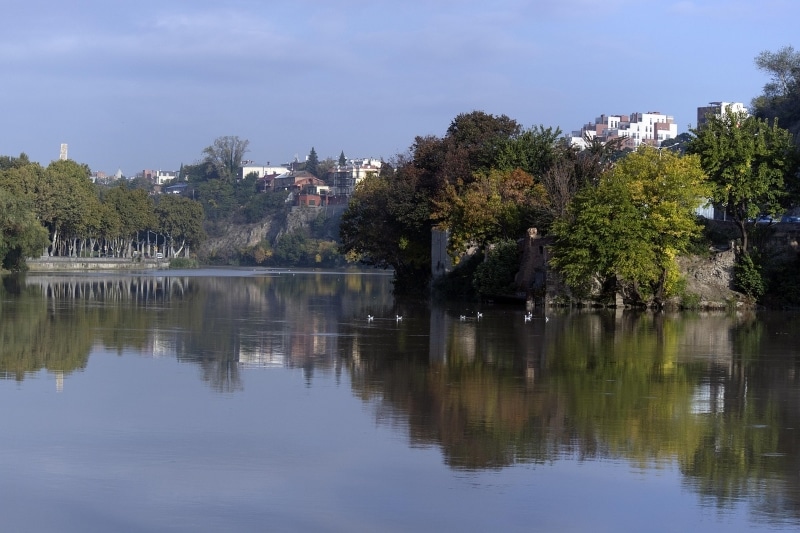
This is one of the most popular neighborhoods for families since it’s home to many international schools.
- International schools: One of the main reasons families choose Vake is proximity to schools like QSI International School, British International School of Tbilisi, and European School. If you’re relocating with kids, this can make a huge difference to your daily routine.
- Lifestyle: Life in Vake is peaceful and steady. Don’t expect nightlife or street festivals. Instead, you’ll find people walking their dogs in Vake Park, picking up bread at Entrée, or shopping at Carrefour or Goodwill. It’s quiet, clean, and comfortable.
- Newer buildings: Many buildings in Vake are modern and come with good insulation, elevators, and reliable heating, things that aren’t always guaranteed in other parts of Tbilisi.
That said, there are two main downsides to living in Vake.
- First, it’s one of the most expensive neighborhoods in the city. You’re paying for convenience, safety, and greenery.
- Second, there’s no metro access. Most expats here own or rent a car, especially families with kids. During school hours, Chavchavadze Avenue is often congested, and traffic can get frustrating.
For me, I don’t think I will be staying here in Vake since it feels a bit too polished or even dull. But if you’re raising a family and want comfort and green space, Vake is one of the best neighborhoods in Tbilisi to settle in.
Saburtalo
Good for: Digital nomads, students, long-term expats
Average rent: Around $350–$500/month for a one-bedroom apartment
Pros: Affordable, excellent metro access, modern amenities
Cons: Less charm than older neighborhoods, traffic can be heavy, some areas feel generic
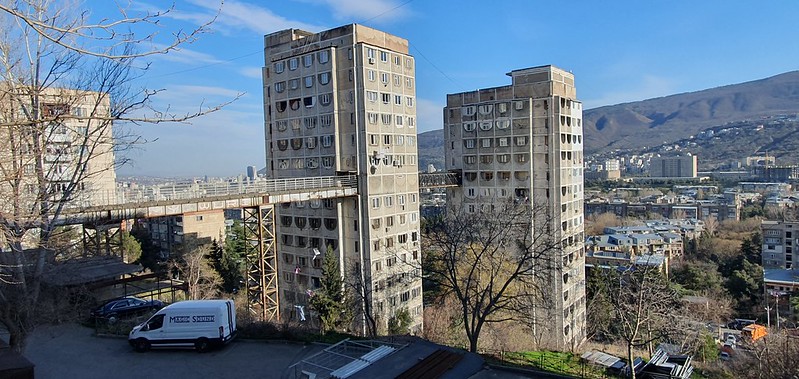
Saburtalo is one of the most convenient places to live in Tbilisi. It’s a large residential area that mixes old Soviet-era apartment blocks with modern high-rises and shopping complexes. While it may lack the charm of Vera or the greenery of Vake, it makes up for it with day-to-day practicality.
- Getting around is easy: The Saburtalo metro line cuts right through the district, with stations like Delisi, Technical University, and Medical University. If you rely on public transportation, this is a huge plus. Living close to one of these stations will save you a ton of time on your daily commute.
- Everything is within reach: You’ll find just about everything you need within a few blocks: City Mall Saburtalo, Goodwill Supermarket, banks, clinics, gyms, and fitness centers. It’s a neighborhood built for convenience.
- Coworking spaces: For digital nomads, Terminal Saburtalo offers a modern, quiet workspace. It may not have the artsy community feel of Fabrika in Vera, but it’s functional, fast, and rarely crowded.
- Housing: Newer buildings here are typically more affordable than in Vake, and often come with better insulation, elevators, and heating. Many also offer underground parking. The older Soviet blocks are cheaper but come with quirks including thin walls, squeaky plumbing, and outdated interiors.
- University presence: Saburtalo is home to several major universities, which gives the area a younger, more energetic vibe. You’ll find plenty of cafés, fast-food chains, and bubble tea shops catering to students.
The downside:
- Saburtalo can feel a bit bland. The wide roads, concrete facades, and chain stores give it a somewhat generic atmosphere.
- Traffic here is no joke. Expect congestion during rush hours, especially along Nutsubidze Street and Kavtaradze Avenue.
If I were to move to Tbilisi, I would seriously consider Saburtalo. It’s convenient and affordable. There are many expats living in this area too.
Old Tbilisi (Sololaki)
Good for: Short-term expats, creatives, first-timers in Tbilisi
Average rent: Around $450–$600/month for a one-bedroom apartment, depending on building condition and proximity to Liberty Square
Pros: Full of character, extremely walkable, lively food and bar scene
Cons: Tourist-heavy, noisy, older infrastructure, hard to park
Sololaki is where you feel like you’ve landed right in the heart of Tbilisi’s story. It’s one of the city’s oldest and most iconic neighborhoods. It’s also just a short walk to Liberty Square and the Old Town, which makes it perfect if you’re new to the city and want everything at your doorstep.
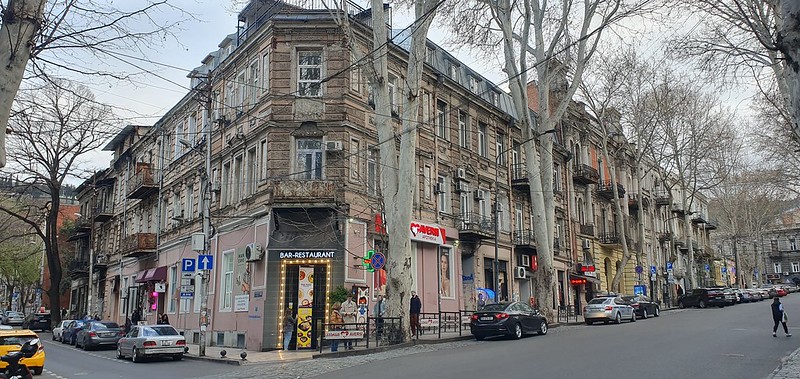
This area is full of cafés, wine bars, and underground art spaces. You can grab a morning pastry at Tone (a traditional Georgian bakery), cowork for a few hours at a cafe, then head to places like Black Dog Bar for craft beer and live music.
So, here’s a quick list of why people live in Sololaki:
- There are just plenty of things to do here. It’s home to wine bars, jazz clubs, independent bookstores, and local designer boutiques. You’re also just minutes from Freedom Square and major sights like the Bridge of Peace, Botanical Gardens, and the Mother of Georgia monument.
- The whole area is walkable. You can walk to most places downtown, hop on a bus, or take the metro from Liberty Square Station, which is only a few minutes away on foot.
- It’s easy to meet new people and make friends. You’ll find a mix of locals, artists, travelers, and digital nomads here. The laid-back vibe makes it easy to strike up a conversation.
But living in Sololaki does have its trade-offs:
- The streets can get noisy, especially on weekends or during tourist season.
- Parking is basically nonexistent unless your building comes with a private space (which is rare). Even locals often avoid owning a car here.
- Some buildings are poorly insulated and may have unreliable plumbing or heating. A “renovated” flat here could mean anything from fully modern to just freshly painted.
Overall, I think Sololaki is good for tourists. While there are tons of things to do and very convenient living here, it can be too chaotic.
When living long-term, I prefer to live in a quieter neighborhood but still convenient to get around.
Mtatsminda
Good for: Couples, short-term expats, history lovers
Average rent: Around $500–$650/month for a one-bedroom apartment
Pros: Beautiful views, historic charm, peaceful vibe
Cons: Steep hills, limited public transport, pricier than practical
Mtatsminda is one of the most beautiful neighborhoods in Tbilisi. It’s on the hill above the city center where you get a postcard-worthy view from nearly every street corner. Looking at pictures from Google Street, it’s like a romantic old movie with cobbled lanes, wooden balconies, and classic Georgian architecture everywhere you look.
It’s also a quiet, slow-paced part of town. And you’re close to several landmarks, including Mtatsminda Park, the Funicular, and Mama Daviti Church.
That said, Mtatsminda comes with some clear trade-offs:
- There isn’t much going on apart from parks and historical sites
- It’s very hilly, so getting around on foot can be tiring
- Daily life without a car is inconvenient
- There are no major supermarkets nearby
So in my opinion, Mtatsminda is a great area if you want to wake up to stunning views and don’t mind sacrificing convenience. But if you have an active lifestyle or still want easy access to modern city life, Mtatsminda probably isn’t the best fit.
Also, going uphill and downhill everyday is definitely not for everyone.
Avlabari: Best for Cultural Immersion on a Budget
Good for: Budget-conscious expats, language learners, long-term stays
Average rent: Around $250–$400/month for a one-bedroom apartment
Pros: Affordable, strong local vibe, quick metro access
Cons: Fewer expat-friendly spots, some buildings feel rundown, limited nightlife
Avlabari is just across the river from Old Tbilisi, but it feels like a different world. The neighborhood has a slower, more grounded pace. You’ll hear Georgian (and sometimes Armenian) spoken on the streets, see neighbors chatting on stoops, and pass by family-run bakeries.
It’s home to a mix of old Soviet-style apartment blocks and newer buildings, with a handful of small cafes and local shops scattered throughout. You’re also near key landmarks like Sameba Cathedral and Rike Park.
That said, Avlabari has some notable downsides:
- It’s not very expat-oriented. There aren’t many international restaurants or coworking spaces
- Some parts of the neighborhood feel underdeveloped or a little neglected
- It’s quiet, so if you’re social or outgoing, you might find the area a bit too subdued
In my opinion, Avlabari is a great pick if you want to save money, live among locals, and experience the “real” Tbilisi.
Other
Good for: Long-term expats on a budget
Average rent: Around $200–$300/month for a one-bedroom apartment
Pros: Very affordable, strong local vibe, metro access in parts
Cons: Far from the expat scene, older buildings, fewer cafés and coworking spaces
If you’re staying in Tbilisi long-term and want to stretch your budget, you can check out neighborhoods like Didube, Temka, and Nadzaladevi. These areas are farther out from the city center, but they offer some of the lowest rents in town and a deeply local atmosphere.
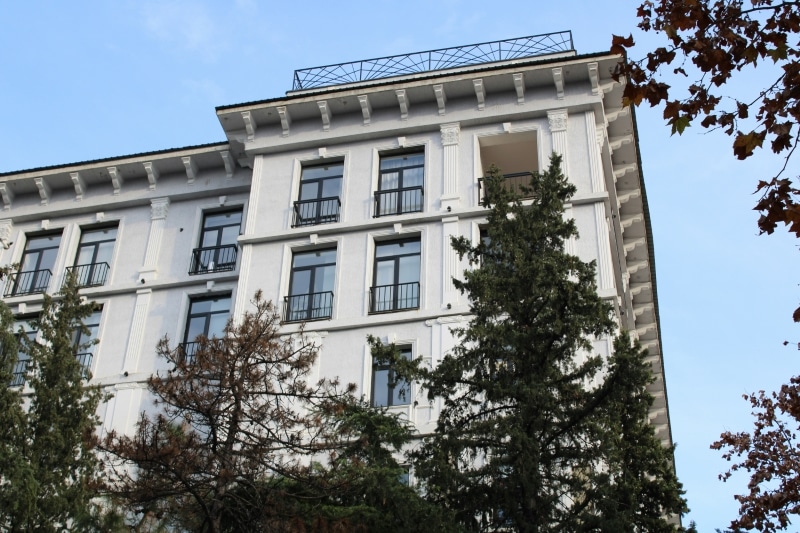
You’ll find street markets, mom-and-pop bakeries, and hardware stores where everyone knows each other. Nadzaladevi and Didube are connected to the metro line, which helps cut down on commute time. But Temka, in particular, is more isolated and may require a car or regular use of taxis.
That said, daily life here comes with a few trade-offs:
- Most buildings are Soviet-era and haven’t been updated in years
- Walkability is limited. You’ll need to rely more on public transport or rideshares
- You’ll find very few expat-oriented services or international restaurants
Still, these neighborhoods are better suited for expats who already know their way around Tbilisi and are comfortable living with fewer amenities. If your main priority is keeping costs low and you don’t mind older buildings or a more local (and sometimes gritty) atmosphere, this part of the city can work. But it’s not for everyone.
Tbilisi Neighborhood Comparison Table
Here’s a comparison table to quickly help you choose the most suitable neighborhood in Tbilisi, based on your budget, lifestyle, and daily needs.
| Neighborhood | Good For | Avg. Rent (1BR) | Pros | Cons |
| Vera | Digital nomads, young professionals | $450–$600 | Walkable, creative vibe, great cafés, expat-friendly | Older buildings, limited green space, tough parking |
| Vake | Families, expats with kids | $500–$700+ | Safe, clean, near international schools and parks | No metro, traffic jams, expensive |
| Saburtalo | Digital nomads, students | $350–$500 | Affordable, metro access, all-in-one convenience | Can feel generic, traffic congestion |
| Sololaki | Short-term expats, creatives | $450–$600 | Historic charm, walkable, lively food/bar scene | Noisy, touristy, poor insulation, hard to park |
| Mtatsminda | Couples, history lovers | $500–$650 | Stunning views, peaceful, historic buildings | Very hilly, few shops, poor transport, not ideal for daily errands |
| Avlabari | Budget expats, cultural immersion | $250–$400 | Local vibe, affordable, close to landmarks and metro | Limited cafés, older buildings, quiet social scene |
| Other (Didube, Temka, etc.) | Long-term budget expats | $200–$300 | Cheapest rent, local markets, some metro access | Older housing, less walkable, far from expat amenities |
Frequently Asked Questions about Tbilisi Neighborhoods
Here’s some Frequently Asked Questions about Tbilisi neighborhoods:
Which Neighborhood is Considered the Safest in Tbilisi?
According to Numbeo’s crime index, Tbilisi has a low crime index and is generally considered very safe, especially compared to other capital cities. Most crimes reported are non-violent and involve petty theft or scams in touristy areas like the old town.
Anyway, in terms of neighborhoods, all major expat areas, Vake, Vera, Saburtalo, and Sololaki, are considered safe for day-to-day life.
Vake is often singled out for its quiet, residential streets, embassy presence, and well-lit sidewalks. Vera and Saburtalo also feel secure, especially around main roads and metro stations.
What’s the Best Neighborhood in Tbilisi for Retirees?
In my opinion, Mtatsminda is a top pick for retirees who want quiet, scenic views and a quiet life. It’s peaceful and a bit removed from the downtown hustle. However, if hills are an issue for you, avoid Mtatsminda.
Avlabari is another good choice thanks to lower rent and good metro access. It has more of a local vibe, but that’s exactly what some retirees look for.
Where do Most Digital Nomads Live in Tbilisi?
Vera is the unofficial digital nomad hub. It’s full of coworking cafés, hostels, and a strong creative scene. Saburtalo is another good alternative. It’s more affordable and has great metro access, though it’s a bit more residential.
On the other hand, Sololaki also attracts short-term nomads who want to live in a walkable area close to the Old Town and nightlife.
What is the Most Walkable Area in Tbilisi?
Old Tbilisi (especially Sololaki) is the most walkable part of the city. You can easily get around on foot. Vera is also highly walkable, though a bit more spread out.
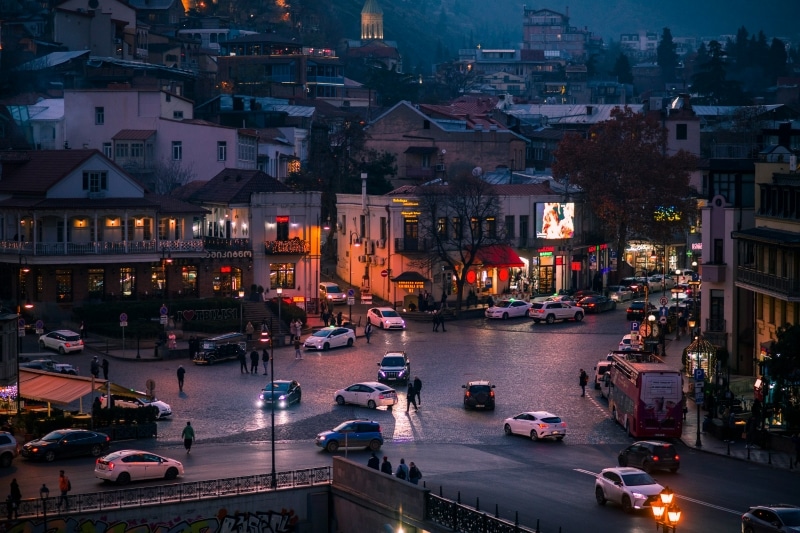
Vake vs. Vera. What’s better for expats?
The two areas are quite different.
- Vake: Family-oriented, green, quiet, no metro, pricier. Ideal for expats with kids or those seeking stability and calm.
- Vera: Walkable, social, artsy, with coworking spots and nightlife. Better suited for singles, couples, or nomads.
Therefore, choose Vake if you have families, want parks and schools. Choose Vera if you want culture and cafés.
What are the Top Areas for Families in Tbilisi?
Vake is hands-down the most popular family neighborhood thanks to its proximity to international schools, parks, and private clinics.
Alternatively, Saburtalo is another good choice. It’s more affordable, has newer buildings, and is well-connected by metro.
Can I Live in Tbilisi Without Speaking Georgian?
Yes, especially in areas like Vera, Saburtalo, Vake, and Sololaki. Younger Georgians often speak English, and signs on the metro are bilingual.
On the other hand, in outer districts like Didube or Temka, English is less common, so you need to know basic Georgian or Russian in order to live there comfortably.
How does the Cost of Living Differ Between Central and Outer Neighborhoods?
There’s quite a different cost of living between central and outer neighborhoods. To give you an idea:
- Central areas (Vera, Vake, Sololaki): Rent ranges from $450–$700/month for a 1-bedroom. Food and services are also more expensive.
- Outer neighborhoods (Didube, Temka, Nadzaladevi): Rent drops to $200–$300/month. Markets and utilities are cheaper, but you’ll have fewer cafés and coworking options.
How Easy is It to Get Around Tbilisi by Public Transport?
It’s quite easy to get around the city, especially if you live near the metro. In fact, the Tbilisi metro is one of the cheapest I’ve ever seen. Just about 1.00 GEL (about $0.35) per ride. Tbilisi has two main metro lines, with stations in Saburtalo, Avlabari, and near Vera. It’s clean, reliable, and runs every few minutes.
There are also buses and marshrutkas (minivans). If you live in Vake or Mtatsminda, where the metro doesn’t reach, you’ll rely more on buses, taxis, or Bolt.
What’s the Right Neighborhood for Me?
At the end of the day, the best neighborhood in Tbilisi depends on your lifestyle, budget, and how long you plan to stay.
- If you’re a digital nomad or solo expat, start with Vera or Sololaki. They’re walkable, social, and packed with cafés and coworking spots. These are also the two neighborhoods I will seriously consider when I have a chance to move there.
- Families tend to prefer Vake for its international schools, green space, and safety. But it comes with higher rent and no metro.
- Long-term expats or those on tighter budgets often settle in Saburtalo, where the rent is lower but access to transit and shops is still solid. Some also stay in Avlabari.
- Retirees or those seeking peace and views may find Mtatsminda appealing. Just be prepared for hills and less convenience.
If you’re unsure where to start, I recommend test-living in an Airbnb in one or two neighborhoods for a month before locking in a long-term lease. This gives you time to feel out the commute, the noise level, and lifestyle.
And finally, be honest with yourself about your priorities. Do you care more about nightlife or quiet mornings? Do you need fast internet and coworking, or are you just looking for clean air and mountain views? Tbilisi has a place for you. You just need to find the right fit.


